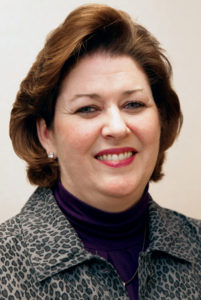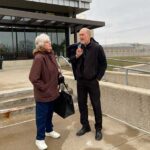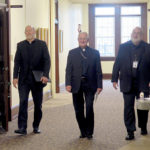By Dr. Ann O’Donnell
(Editor’s note: Catholic Health Care Today features Catholic health care experts from St. Thomas Aquinas Guild of the Quad Cities sharing their thoughts on timely issues.)
 As a Catholic and a medical director of hospice and palliative care, I do not believe that it is God’s intention for us to suffer at the end of our life. I believe that God intends for us to transition to our eternal life where we are free of pain and suffering. This premise helps me to find personal and professional satisfaction in the work that I do every day.
As a Catholic and a medical director of hospice and palliative care, I do not believe that it is God’s intention for us to suffer at the end of our life. I believe that God intends for us to transition to our eternal life where we are free of pain and suffering. This premise helps me to find personal and professional satisfaction in the work that I do every day.
The discussion surrounding death and dying is not a conversation that I take lightly. I believe I was called to minister to this group of people early on in my life and career. As a physician, I have always felt it was my responsibility to educate my patients about their disease, treatment options available or lack thereof. With the help of your primary physician, I hope you are planning a long and healthy life. However, the time will come when your conversation needs to take a different path.
Many options exist today, which is why a thorough conversation with your doctor and family members needs to take place at the time of a new diagnosis or change in your condition. I encourage you to speak up and say what YOU want. Not what you think everyone else wants you to do. When you have made an educated and informed decision, my responsibility as the physician is to advocate for you to receive the care you have requested. When you have a chronic or life-limiting disease, this discussion and decision needs to include your end of life wishes. This is an essential part of what we refer to as Advance Care Planning.
Today we plan everything. We plan to get a job, marry and perhaps have children. We plan our vacations and retirement. Even though medical advances have provided us with ways to live longer, our bodies ultimately wear out. Thus, you also need to plan for the end of your life. As we approach the next and possibly last phase of our life, it is important to know what healthcare services are available to help us make that journey.
Dame Cicely Saunders, nurse turned physician, is credited with developing our current understanding of hospice care. In the 1950s she emphasized care of the total patient, not the disease. That included their psychological and spiritual needs in addition to physical needs. It was important to address the physical pain, but also the fears of the patient and his or her family. That philosophy is how we, in hospice care, approach our calling today. The hospice team includes a nurse, social worker, chaplain, hospice aid, music therapist, massage therapist, pet therapist and volunteers who perform assorted duties. Your hospice physician oversees your hospice care but your doctor (family medicine, cardiologist, pulmonologist, oncologist, etc.) is encouraged to remain actively involved in your care.
You need not fear hospice care. Hospice began as a way to provide comfort and end of life care to patients with cancer. Now two-thirds of the patients receiving hospice care have a non-cancer diagnosis. Hospice is a six-month benefit for Medicare and many other commercial insurance policies. In 2015, only 46 percent of people who were eligible for hospice care received it. Approximately 55 percent received care for fewer than 30 days.
If I have heard it once, I have heard it a hundred times. “I wish we would have started hospice sooner.” One of the common misconceptions regarding hospice care is that we stop all of your medications and “just let you die.” That is simply not true. Rather, hospice care changes the focus from preventative care to end of life or comfort care.
Not surprisingly, patients on hospice tend to live longer and end their life more comfortably. We are also there to support your family during this difficult time as they adjust to their loss. The purpose of hospice care is never to hasten or bring about your death sooner than should naturally occur. Don’t we deserve and shouldn’t we receive all of the services that are available to us in our final weeks and months of life? I believe so!
Discussing death and dying is never easy but there comes a time in our life when it should not be avoided. The infamous elephant in the room does not go away when we ignore it. My experience, after 18 years of providing hospice care, is that most people overestimate the time they have left when they are nearing the end of life.
When you are struggling with the decision regarding your next steps, consider this. Instead of asking, “Do you think it is time for hospice?” you might ask, “Would you be surprised if your loved one would still be alive in six months?” If you would be surprised, then it is time to have an end of life conversation with your family and with your physician. Do not miss your opportunity to, with the help of God’s guidance, direct your final journey.
(Ann O’Donnell is Medical Director for Genesis Hospice and the Clarissa C. Cook Hospice House. She is a member of the Saint Thomas Aquinas Guild of the Quad Cities and St. Paul the Apostle Parish, Davenport).











